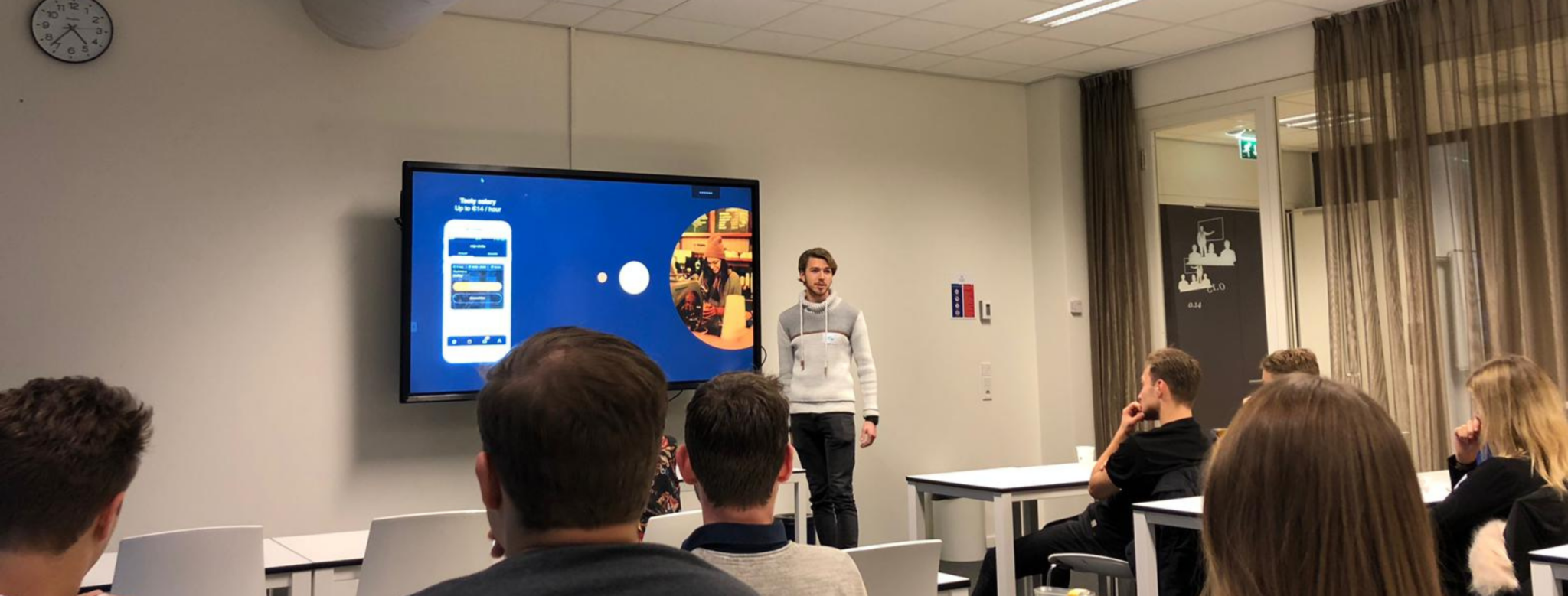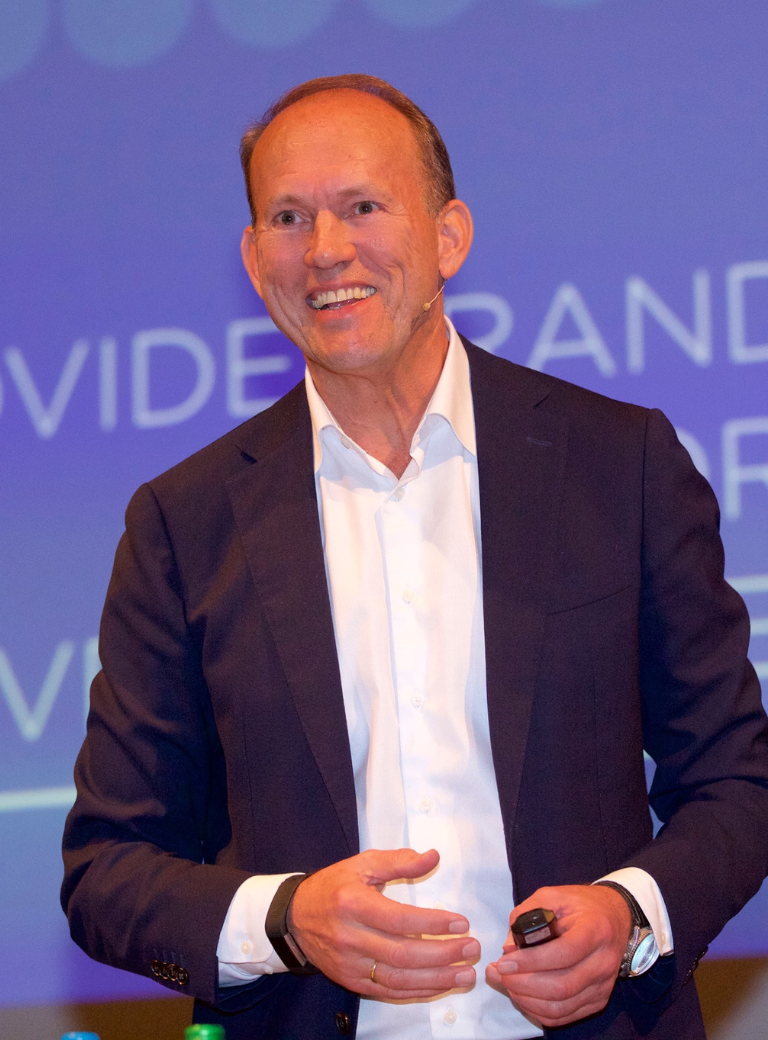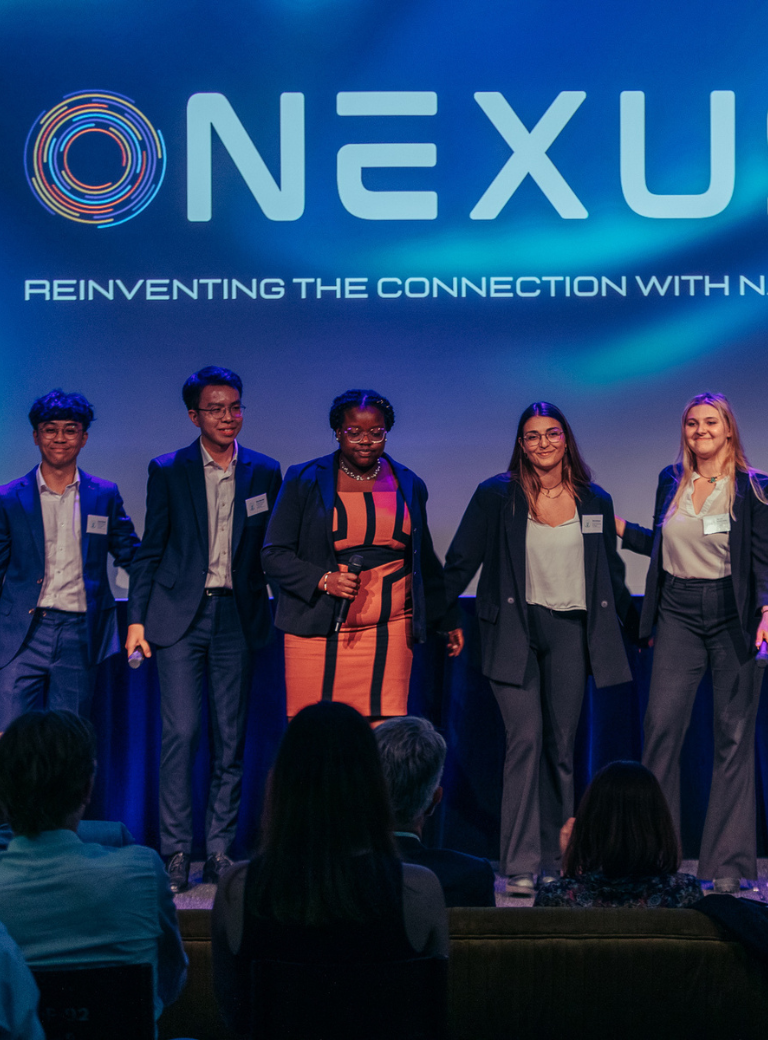

How can staffing be enhanced by technology?
An interview with the Co-Founder of BrightSpike and Shiftly – by Răzvan Dumitru
As proven by previous stories that we shared, entrepreneurship is about making ideas happen. Viktor Wassmann, a German alumnus who graduated from The Hague campus in 2018, chose the entrepreneurship path even before completing his studies. As he worked as a temporary employee through an agency, Shiftly started from him noticing that the process of signing up for shifts was not facile at all. On the other hand, BrightSpike has a completely different story.
What did you do after graduating?
I started Shiftly before graduating. Together with a fellow colleague at the time, one and a half years before graduating, we started Shiftly - an online marketplace that offers a direct connection between employers and students in the hospitality sector of The Hague. I wrote my thesis about Shiftly as well. I did business model research and created the business model from scratch.
I graduated in February 2018 and we were already live with a prototype. Thus, we launched our app in September 2018. Back to your question, the time after my graduation mostly revolved around working on Shiftly and trying to make it a successful project. I did that for about a year after graduating until I eventually sold my shares.
When did you discover your passion for entrepreneurship? And what are the must-haves to be an entrepreneur?
I think that the main driver of success was my passion for entrepreneurship. Even before being a Hotelschool student, since around 19 years old, I kept brainstorming ideas for businesses and thinking of possible start-ups. However, I never actually set any of these projects up or tried to capitalise on them. In terms of the must-haves for an entrepreneur, I think that anyone can start any kind of project, but the real must-haves are dedication and initiative. Once the ball is rolling and you see your project growing, perhaps faster than you ever expected, you will realize that it was all worth it. The best advice that I can give is that every person with a business idea should just start tomorrow. You do not need to have everything figured out in one day. It is not even possible. It is crucial to take the first step, regardless of the nature of this first step – it could be research, brainstorming, or many more. The second step is to build perseverance and not expect that your prototype will work perfectly from the first time. Shiftly also did not work initially but we kept adapting the business model and so, it became a success.
I believe that anyone can acquire the required skills over time. The personality of the entrepreneur also has a substantial influence on the project. It is crucial to be willing to take risks, seize opportunities and chase the dream. Once you develop a critical view, continuous improvement will follow. I would also like to recommend being critical about any product or service that you purchase. You might have a brilliant idea to innovate it one day.

How did Shiftly start and what was the main idea behind it?
Shiftly is a platform for hospitality companies and employees to connect for a single shift. Since I used to work for a temp agency that was more of a traditional one, it used to schedule the temp workers by making use of WhatsApp and communicating through a group chat which approximately 130 people were part of. For instance, if ten shifts would become available today, they used to list all of them by typing a text message. Needless to say, because people saw that one message at different times throughout the day, they would reply to it individually, making it incredibly difficult to navigate through the group chat. Due to this procedure, a temp would need to read around 60 messages to check which shifts are still available and apply for the ones still open.
Regularly, shifts that I wanted to take were already taken by people whose messages I had completely overlooked. After being part of this system and working with it for a while, I started having numerous ideas that would improve communication and make the whole process much easier. That was the ideation process. During this stage, the main question was “How can we do this better?”.
After funnelling our ideas, we concluded that a marketplace platform was the best solution. One of the reasons behind this choice was the popularity of other freelance marketplaces at the time. And so, we started setting up our own marketplace for shifts. At a later stage, we shifted to a payroll system that we made use of in order to hire people on a zero-hour contract. Hence, our business came into existence as a result of a joint effort to provide temporary workers with a seamless and facile experience. We worked on this project until 2019 when my partner and I sold Shiftly to our angel investors.
What kind of obstacles did you encounter so far with BrightSpike, and how did you overcome them?
Bright Spike is a different proposition. We offer Teamer, a workforce management software-as-a-service (SaaS) for consulting companies. This labour management software offered by us, allows for searching, capacity management, and reporting. All-in-one solution for boosting agency, consultancy, and law firm workflow efficiency. Thus, this software can help companies in onboarding, for example, 100 consultants onto their system. On the other side, as a manager, the user can search through profiles and see the projects people are already working on and how many hours they already spent working on them. BrightSpike came into existence also because I saw a problem and looked for solutions to solve it. While applying for jobs in consulting and working in the field, I observed that companies do not have a professional capacity management system. Companies would usually store and organise this kind of data in Excel and consultants would have access to everything. There is no permission management whatsoever. We launched our first version, and our pilot customer is actually my employer. weGrow is now able to search for the right profiles and manage the capacities of its consultants.
Since I am generally optimistic as a person, and maybe overly optimistic sometimes, I feel like the market is ripe for a product like ours. It seems like software such as ours will become the solution to these organisational problems in a couple of years. The only issue that we might face is the resistance coming from the employees of our potential clients because integrating a new system into the usual routine of employees could be challenging. This is why each employee needs to be shown how our system is meant to ease their work. This is a plan that we are still developing. Apart from that, we do not see any major obstacle to BrightSpike becoming successful.

What is your opinion about the integration of technology in staffing? Will it become a norm in the coming years?
I believe that it most certainly will, at least within consulting and legal firms. Unfortunately, most companies of this sort make use of Excel to organise and keep track of their employees’ work. There are a few other systems that deal with capacity management but outdated and less user-friendly for this day and age when everyone is only a few clicks away from the information they are looking for. Since global consulting and legal companies often create their own systems, we aim to cater to the small to medium-sized companies that comprise 100 to 1000 employees because we think that such solutions are already in high demand for such firms.
We chose this industry because consultants usually have specialized expertise and being able to organise, filter and choose them based on different criteria is crucial for consultancy companies. It does not only matter what seniority or position they have but also their profile. I think that capacity management in consulting will start looking like scheduling in hotels or schools.
What are the major obstacles for start-ups in growing and moving to a global scale?
The most common one arises once a company has grown in its home market and would like to expand to another one. This choice needs to have very solid reasoning behind it. Even though a product or service might have a booming success in the Netherlands, as an example, it might fail to succeed in Germany due to regulations, mindset or customs of either the employees or companies or many other reasons. This is why companies should really “do their homework” and thoroughly analyse the country and market that suits their product before making such a decision. Entering markets blindly might result in completely unexpected outcomes.
The second major issue relates to the talent side. Just like in hospitality, it is very challenging to find the right people who are willing to stay. Entering a new market usually means assembling a new team of individuals who have complementary attributes.
All in all, I think that planning is decisive for any company that wants to expand. In some industries, the competition can be so fierce that planning should happen one year before penetrating a new market.
What achievements are you most proud of?
I take much pride in having turned Shiftly from an ambitious project into a real-life company. It was one of the greatest projects of my life so far. Shiftly would not have materialised, should it not have been for our dedication and the long hours of work that my partner and I had put into it. Selling my shares was also a proud moment because it was the moment that I realised the fact that Shiftly, a company that started from a simple idea, became a company that was worth money.
What is your biggest failure?
With Shiftly, we initially started as a freelance platform. After that did not work according to the plan, I wanted to sell the software to existing agencies so that they could use it for their own purposes. After getting in contact with potential customers, we came across one that was interested in our project. However, they were not interested in the project per se, but rather willing to invest in us. And so, we shifted to a payroll software model. Eventually, we agreed to sell part of our shares in order to get an investment that would allow us to fund the product development and the whole business model shift. In return, we gave away 51% equity. That meant that we, as founders, had 49% left. That 49% was split between me and my partner, and we were satisfied with it since it was a unique opportunity. Overly optimistic, some might say. Nonetheless, it worked out well in the end and we launched the software and platform. We started to become aware of the problem later on when we wanted to raise another substantial investment.
As we were pitching at some events, many investors started to become genuinely interested in our idea. They liked both the product and the team and so, they would have been willing to invest. The only problem was that the founders had a minority share. Basically, my partner and I were not owning the company anymore and did not have the decision-making power. That was the reason why we could not acquire new investments. That was the reason why we sold our shares to our angel investors, because there was no way out. The mistake was giving away that much equity.
I think that the lesson that I learned is that you should always call out to experienced advisors when setting up a company because that could have been easily avoided. Nowadays, I am on good terms with those angel investors, but it was such a disappointment not being able to grow our project at that time.
What is your favourite book?
Never Split the Difference by Chris Boss. It is a very concise and valuable book, in my opinion.
What is the last movie that you saw?
Interstellar! I really liked the story and the soundtrack.
Are you a morning person or a night owl?
More of a morning person.
What is your biggest dream in a few words?
Just being able to structure my day as I want to, without anyone interfering with it.
Name one thing on your bucket list.
I am currently learning how to sail, and I want to sail from the Netherlands to the Mediterranean one day.
Name one thing that you like to do in your free time.
Kite surfing is what I like the most because it really enables me to shut off anything else and just be in the flow of doing it.
What is your favourite place to visit?
Since I love being in the mountains, that would be the Alps. The Austrian Alps especially is where I usually go skiing.
What is your favourite aspect of living in the Netherlands?
The fact that everyone is very relaxed. It is very different from Germany in the sense that you have a very relaxed work environment. For instance, at least in most start-ups, there is not a lot of hierarchy. I enjoy that because even if an individual is junior, he or she still has a saying and is given responsibility.
What is your favourite aspect of living in Thailand?
What I love about Thailand is the humbleness and hospitality of the people. They are very friendly and welcoming.
What would be your advice for students graduating in 2021?
Life could be anything that you would like it to be.





